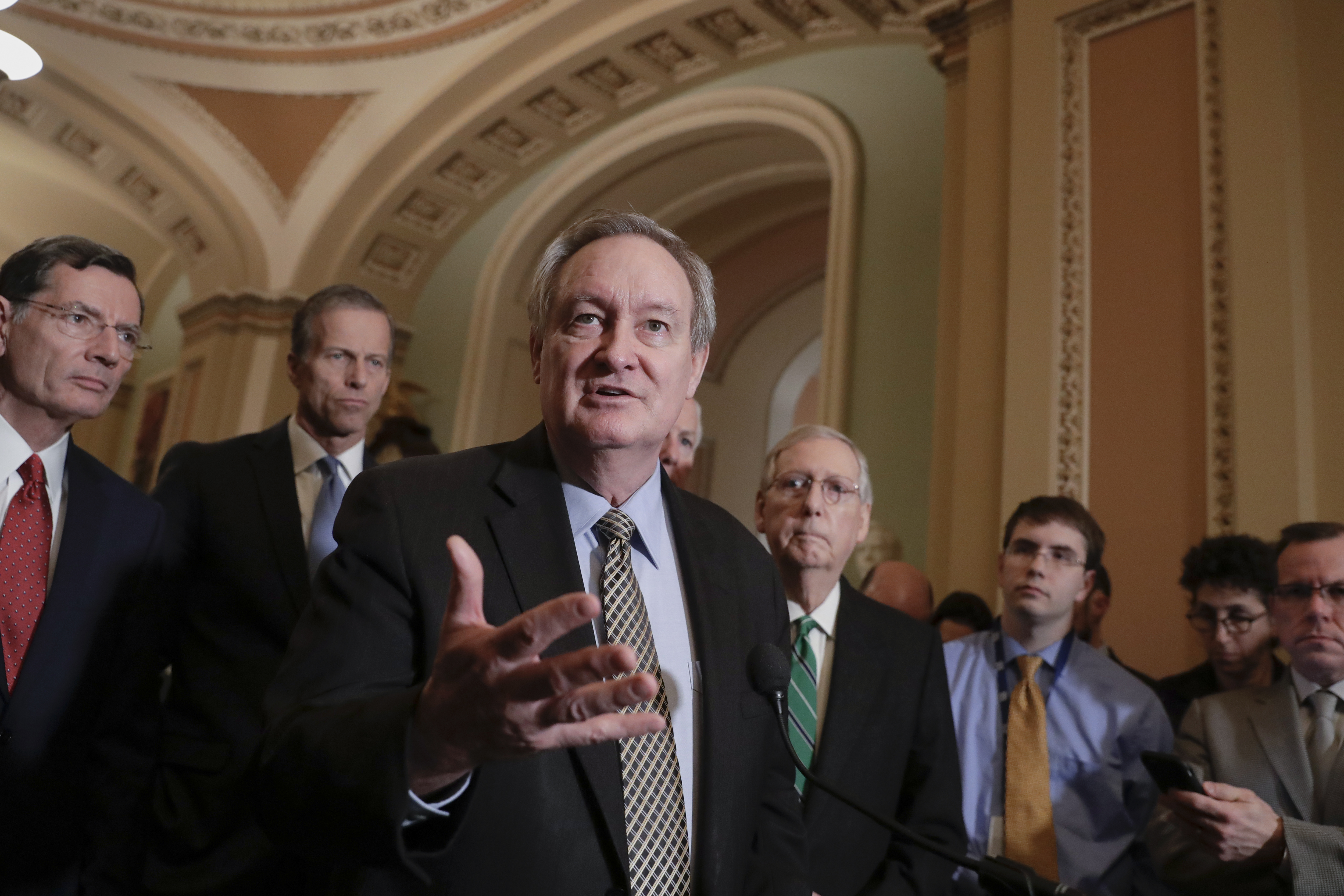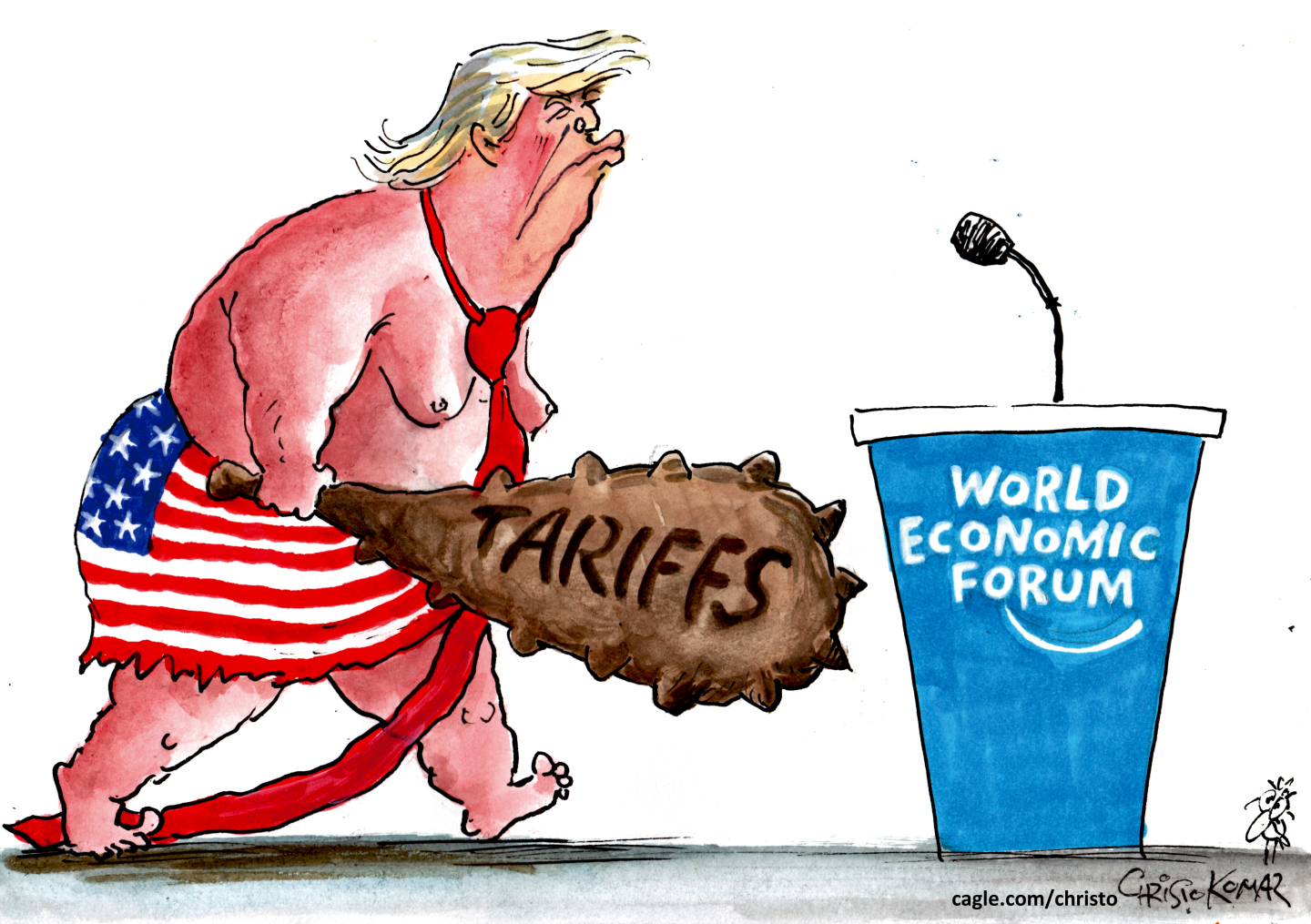How Senate Democrats rolled over and played dead for Wall Street
Their courage and conviction was so short-lived ...


A group of gutless Senate Democrats seem downright eager to grovel to Wall Street and help Republicans roll back financial reform.
In 2010, the Dodd-Frank Act imposed a slew of new regulations on Wall Street in an attempt to prevent a repeat of the disastrous 2008 financial crisis. The law was always imperfect — but its intentions were good, and many of its core elements (like the creation of the Consumer Financial Protection Bureau) have been solid. But now, a bill shepherded by Senate Banking Committee Chairman Mike Crapo (R-Idaho) aims to partially dismantle some of Dodd-Frank's safeguards.
This Republican effort to roll back financial regulations is hardly shocking. But what is surprising is that a dozen or so Democratic senators also support it, virtually guaranteeing the bill's passage sometime this week.
The Week
Escape your echo chamber. Get the facts behind the news, plus analysis from multiple perspectives.

Sign up for The Week's Free Newsletters
From our morning news briefing to a weekly Good News Newsletter, get the best of The Week delivered directly to your inbox.
From our morning news briefing to a weekly Good News Newsletter, get the best of The Week delivered directly to your inbox.
Most remarkable is what these bowing-to-the-banks Democrats are getting in exchange for their cooperation: nothing.
At the core of Crapo's bill is a change to which banks are deemed "systemically important" (translation: too big to fail) and thus subjected to much stricter regulation. Dodd-Frank set the threshold at $50 billion in assets. Crapo's bill would raise it to $250 billion, and soften a number of regulatory triggers that occur along the spectrum from $50 billion to $250 billion.
I will concede that $50 billion may be too low. But $250 billion is clearly too high. "The bill permits about 25 of the 40 largest banks in America to escape heightened scrutiny and to be regulated as if they were tiny little community banks that could have no impact on the economy," said Sen. Elizabeth Warren (D-Mass.), who's leading the progressive charge against the bill. These sorts of midsized banks have played key roles in previous crises like the savings and loan debacle in the 1980s. In fact, the banks exempted by Crapo's bill account for 20 percent of all banking assets in America.
The bill also monkeys with a lot of technical language that will inevitably muddy the regulatory authority of agencies like the Federal Reserve, opening them up to the possibility of endless lawsuits. And it creates a number of other possible regulatory loopholes that the titans of finance could greedily slip through.
A free daily email with the biggest news stories of the day – and the best features from TheWeek.com
How did Wall Street find itself on the precipice of such a coup? You can thank a massive lobbying and campaign donation machine cranking into high gear. The result was that what was once a semi-reasonable bill got loaded up with far more extreme changes. Nervous Democrats from red states — such as Sens. Jon Tester (Mont.), Heidi Heitkamp (N.D.), and Joe Donnelly (Ind.), among others — obliged, all while clinging to the initial idea of relief for small community banks as a fig leaf.
"The Main Street banks, community banks, and credit unions didn't create the crisis in 2008, and they were getting heavily regulated," Tester said, going on to weakly assert that "there's not one thing in this bill that gives Wall Street a break."
Tester is very wrong about this. But it might at least be tolerable if Democrats had driven a hard bargain. When you give something to the other side, they should give something back. Call it the art of the deal. But Democrats didn't get anything.
What should they have demanded in exchange for their support? How about expanding consumer protections in the financial sector?
Dodd-Frank certainly took steps in that direction, particularly through the creation of the Consumer Financial Protection Bureau. But shielding Americans from predatory practices by banks, lenders, and other financial outfits remains something of a work in progress (or perhaps a work in retreat). President Trump's pick to head the CFPB, Mick Mulvaney, is moving rapidly to neuter the agency: He's abandoned multiple lawsuits and investigations into payday lenders, may well scuttle another CFPB rule against the same group, and shrunk another investigation into the Equifax data breach.
Crapo's bill does include a few table scraps for consumers: an option to freeze your credit score once a year, and some protections for veterans' medical debt. But these relatively small gestures are akin to insults packaged as aid.
Why didn't Democrats demand a congressional update to arbitration law to finally kill the practice of using mandatory arbitration clauses to prevent wronged customers from suing? Why didn't they demand a nationwide cap on interest rates for credit to cut down on predatory lending practices that fleece low-income Americans? Why didn't they insist on congressional orders to do something about Wells Fargo's consumer abuses and Equifax's negligent handling of Americans' credit information?
Republicans would surely have balked at all these demands. But your negotiations will always end in failure if you don't drive a hard bargain at the outset. Demand the stars and settle for the moon. But there is nowhere to go if you begin by groveling in the dirt.
If the Democrats were feeling ambitious, they might have even insisted on some sort of solution or debt forgiveness program for the student loan crisis. Or they could've demanded a postal banking system — a public option for basic banking services and loans, allowing Americans to bypass private financial services entirely. Or, you know, both!
Instead, the bill largely makes things worse for consumers. Smaller banks and community lenders may not threaten the economy, but they often helped create the exploitative mortgages and toxic loans that flooded the big banks' balance sheets in the run-up to 2008. Dodd-Frank cracked down on those practices, and Crapo's bill loosens its rules. On top of that, the bill scuttles certain requirements that banks report demographic data on lending practices. The ostensible goal is to save small banks regulatory costs. But that information is critical to fighting off racism and discrimination in who gets access to credit and mortgages.
Banks big and small are getting by just fine under Dodd-Frank. Since the Republicans need Democrats to get anything through the Senate, there's no reason to give the GOP or Wall Street a costless win. Waving through this Christmas-for-Wall-Street version of Crapo's bill is just disgraceful.
The Great Recession gave some Democrats a brief burst of conviction and political courage. But actually demanding responsibility from the financial industry is apparently too great a burden to sustain. The old habits of just giving Wall Street what it wants are easier and more comforting. And plenty of Democrats seem eager to return to that warm embrace.
Jeff Spross was the economics and business correspondent at TheWeek.com. He was previously a reporter at ThinkProgress.
-
 5 contentious cartoons about Donald Trump at Davos
5 contentious cartoons about Donald Trump at DavosCartoons Artists take on weaponized tariffs, a cheeky offering, and more
-
 Trump’s ‘Board of Peace’ comes into confounding focus
Trump’s ‘Board of Peace’ comes into confounding focusIn the Spotlight What began as a plan to redevelop the Gaza Strip is quickly emerging as a new lever of global power for a president intent on upending the standing world order
-
 ‘It’s good for the animals, their humans — and the veterinarians themselves’
‘It’s good for the animals, their humans — and the veterinarians themselves’Instant Opinion Opinion, comment and editorials of the day
-
 The billionaires’ wealth tax: a catastrophe for California?
The billionaires’ wealth tax: a catastrophe for California?Talking Point Peter Thiel and Larry Page preparing to change state residency
-
 Bari Weiss’ ‘60 Minutes’ scandal is about more than one report
Bari Weiss’ ‘60 Minutes’ scandal is about more than one reportIN THE SPOTLIGHT By blocking an approved segment on a controversial prison holding US deportees in El Salvador, the editor-in-chief of CBS News has become the main story
-
 Has Zohran Mamdani shown the Democrats how to win again?
Has Zohran Mamdani shown the Democrats how to win again?Today’s Big Question New York City mayoral election touted as victory for left-wing populists but moderate centrist wins elsewhere present more complex path for Democratic Party
-
 Millions turn out for anti-Trump ‘No Kings’ rallies
Millions turn out for anti-Trump ‘No Kings’ ralliesSpeed Read An estimated 7 million people participated, 2 million more than at the first ‘No Kings’ protest in June
-
 Ghislaine Maxwell: angling for a Trump pardon
Ghislaine Maxwell: angling for a Trump pardonTalking Point Convicted sex trafficker's testimony could shed new light on president's links to Jeffrey Epstein
-
 The last words and final moments of 40 presidents
The last words and final moments of 40 presidentsThe Explainer Some are eloquent quotes worthy of the holders of the highest office in the nation, and others... aren't
-
 The JFK files: the truth at last?
The JFK files: the truth at last?In The Spotlight More than 64,000 previously classified documents relating the 1963 assassination of John F. Kennedy have been released by the Trump administration
-
 'Seriously, not literally': how should the world take Donald Trump?
'Seriously, not literally': how should the world take Donald Trump?Today's big question White House rhetoric and reality look likely to become increasingly blurred
